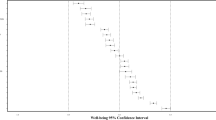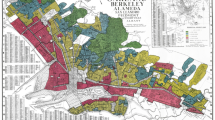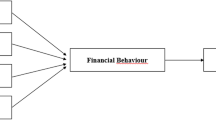Abstract
Household structure for older people’s subjective well-being is important to promote healthy ageing in the context of the rapid increase of the older population. Living with adult children is known to promote older people’s life satisfaction, a key indicator of subjective well-being, whereas others claim a negative impact of such intergenerational coresidence. This study aims to empirically test these theories (family support vs. family conflict), by examining the role of homeownership–another important factor contributing to subjective well-being–in this association between intergenerational coresidence and life satisfaction. Analysing the nationally representative data on the elderly population in South Korea, the findings showed that intergenerational coresidence decreases life satisfaction when the elderly achieve a certain level of housing security by living in owner-occupied housing. Living with adult children is negatively associated with life satisfaction particularly for older old homeowners compared to younger old owners. Our findings provide implications for public policies promoting intergenerational coresidence and asset-based welfare to enhance older people’s well-being in Korea and more broadly in East Asia.

Similar content being viewed by others

Notes
According to the latest Population Census in 2020, people aged 65 or above accounted for 16.4% of the total population in Korea.
Chonsei is a unique rental system in Korea under which a tenant pays a lump sum deposit equivalent to 40 to 60% of the house price to landlord in lieu of monthly rent and fully gets it back when the contract is terminated.
The Housing Lease Protection Act came into effect in mid-2020.
References
Almira, L., Hanum, L., & Menaldi, A. (2019). Relationship with children and the psychological well-being of the elderly in Indonesia. SAGE Open Medicine, 7, 2050312119836026
An, J., An, K., O’Conner, L., & Wexler, S. (2008). Life satisfaction, self-esteem, and perceived health status among elder Korean women: Focus on living arrangements. Journal of Transcultural Nursing, 19(2), 151–160
Banjare, P., Dwivedi, R., & Pradhan, J. (2015). Factors associated with the life satisfaction amongst the rural elderly in Odisha, India. Health and Quality of Life Outcomes, 13, 201
Barger, S. D., Donoho, C. J., & Wayment, H. A. (2008). The relative contribution of race/ethnicity, socioeconomic status, health, and social relationships to life satisfaction in the United States. Quality of Life Research, 18, 179–189
Cairney, J., & Boyle, M. H. (2004). Home ownership, mortgages and psychological distress. Housing Studies, 19(2), 161–174
Carstensen, L. L. (1992). Social and emotional patterns in adulthood: Support for socioemotional selectivity theory. Psychology and Aging, 7(3), 331–338
Chai, H. W., & Jun, H. J. (2017). Relationship between ties with adult children and life satisfaction among the middle-aged, the young-old, and the oldest-old Korean adults. International Journal of Aging & Human Development, 85(4), 354–376
Chen, F., Shen, K., & Ruan, H. (2021). The mixed blessing of living together or close by: Parent–child relationship quality and life satisfaction of older adults in China. Demographic research, 44, 563–594
Cheung, K. C. K., & Chou, K. L. (2019). Poverty, deprivation and life satisfaction among Hong Kong older persons. Ageing and Society, 39(4), 703–721
Choi, N. G., & McDougall, G. (2009). Unmet needs and depressive symptoms among low-income older adults. Journal of Gerontological Social Work, 52(6), 567–583
Connolly, S. (2012). Housing tenure and older people. Reviews in Clinical Gerontology, 22(4), 286–292
Costello, E. J., Compton, S. N., Keeler, G., & Angold, A. (2003). Relationships between poverty and psychopathology. JAMA, 290(15), 2023
Cramm, J. M., van Dijk, H. M., & Nieboer, A. P. (2013). The importance of neighborhood social cohesion and social capital for the well being of older adults in the community. The Gerontologist, 53(1), 142–152
Do, Y. K., & Malhotra, C. (2012). The effect of coresidence with an adult child on depressive symptoms among older widowed women in South Korea: An instrumental variables estimation. The Journals of Gerontology: Series B, 67B(3), 384–391
Doling, J., & Ronald, R. (2012). Meeting the income needs of older people in East Asia: Using housing equity. Ageing and Society, 32(3), 471–490
Gibler, K. M., & Lee, E. (2005). The impact of economic, demographic, and cultural changes on preferences for independent living arrangements and seniors housing in South Korea. Journal of Housing for the Elderly, 19(2), 87–106
Han, C. K., & Hong, S. I. (2011). Assets and life satisfaction patterns among Korean older adults: Latent class analysis. Social Indicators Research, 100, 220–240
Hank, K. (2007). Proximity and contacts between older parents and their children: A European comparison. Journal of Marriage and Family, 79(1), 157–173
Hill, T. J. (2006). Grandchild, grandparent, and parent coresidence from 1970 to 1990: Structural factors affecting state patterns. International Journal of Aging & Human Development, 62, 117–142
von Humboldt, S., Leal, I., & Pimenta, F. (2014). Living well in later life: The influence of sense of coherence, and socio-demographic, lifestyle and health-related factors on older adults’ satisfaction with life. Applied Research in Quality of Life, 9, 631–642
Ichimura, H., Lei, X., Lee, C., Lee, J., Park, A., & Sawada, Y. (2017). Wellbeing of the elderly in East Asia: China, Korea, and Japan. RIETI Discussion Paper Series 17-E-029. Retrieved from https://www.rieti.go.jp/jp/publications/dp/17e029.pdf
Izuhara, M. (2016). Reconsidering the Housing Asset-Based Welfare Approach: Reflection from East Asian Experiences. Social Policy and Society, 15(2), 177–188
Jung, J., & Kim, I. (2017). Effects of living arrangements of the urban elderly on their subjective wellbeing: A comparison between Korea and China. Cogent Social Sciences, 3(1), 1268288
Khodabakhsh, S. (2021). Factors affecting life satisfaction of older adults in Asia: A systematic review. Journal of Happiness Studies. doi:https://doi.org/10.1007/s10902-021-00433-x
Kim, B. J., & Kilhl, T. (2021). Suicidal ideation associated with depression and social support: A survey-based analysis of older adults in South Korea. BMC Psychiatry, 21, 409. DOI: https://doi.org/10.1186/s12888-021-03423-8
Kooshiar, H., Yahaya, N., Hamid, T. A., Abu Samah, A., & Jou, S., V (2012). Living Arrangement and Life Satisfaction in Older Malaysians: The Mediating Role of Social Support Function.PLoS One, 7(8), e43125
Kourouklis, D., Verropoulou, G., & Tsimbos, C. (2020). The impact of wealth and income on the depression of older adults across European welfare regimes. Ageing and Society, 40(11), 2448–2479
Kwak, I. S. (2011). A study on the factors affecting decisions by the super-aged on their preference of living with their children and continuously living in their current houses. Journal of the Korean Housing Association, 22(6), 83–95
Kwon, J. D., & Cho, J. Y. (2000). A study of factors influencing the life satisfaction of the aged. Journal of the Korea Gerontological Society, 20(3), 61–76
Kye, B., & Choi, Y. (2021). Are parents and children coresiding less than before? An analysis of intergenerational coresidence in South Korea, 1980–2015. Demographic research, 45, https://doi.org/10.4054/DemRes.2021.45.1
Lee, J. J. (2009). A pilot study on the living-alone, socio-economically deprived older Chinese people’s self-reported successful aging: A case of Hong Kong. Applied Research in Quality of Life, 4, 347–363
Lee, M. A., Kim, J. B., & Kang, J. H. (2011). Living arrangement and the life satisfaction of Korean older adults: Examining the mediating effects of parent-adult child relationship. Health and Social Science, 29, 41–67
Li, Y., Aranda, M. P., & Chi, I. (2007). Health and life satisfaction of ethnic minority older adults in mainland China: Effects of financial strain. International Journal of Aging and Human Development, 64(4), 361–379
Lin, J. P., Chang, T. F., & Huang, C. H. (2011). Intergenerational relations and life satisfaction among older women in Taiwan. International Journal of Social Welfare, 20(s1), S47-S58 https://doi.org/10.1111/j.1468-2397.2011.00813.x
Mentzakis, E., & Moro, M. (2008). The poor, the rich and the happy: Exploring the link between income and subjective well-being. The Journal of Socio-Economics, 28, 147–158
MoLIT. (2020). 2020 Korea Housing Survey Report. Korea: Retrieved from Sejong
Moser, C., & Felton, A. (2007). The construction of an asset index measuring asset accumulation in Ecuador. CPRC Working Paper 87. Washington DC: The Brookings Institution
Nam, S. H. (2011). Assets of Korean baby boomer generation: The state and issues. Issue & Focus, 115. Seoul: Korea Institute for Health and Social Affairs
Ng, S. T., Tey, N. P., & Asadullah, M. N. (2017). What matters for life satisfaction among the oldest-old? Evidence from China. PLoS One. https://doi.org/10.1371/journal.pone.0171799
OECD (2017). OECD project on the distribution of household incomes. Retrieved from https://www.oecd.org/els/soc/IDD-ToR.pdf
OECD. (2019). Pensions at a glace 2019: OECD and G20 indicators. Paris: OECD
OECD (2020). Social expenditure (SOCS) update 2020. Retrieved from https://www.oecd.org/els/soc/OECD2020-Social-Expenditure-SOCX-Update.pdf
Pani-Harreman, K. E., Bours, G. J. J. W., Zander, I., Kempen, G., I. J., M., & van Duren, J. M. A (2021). Definitions, key themes and aspects of ‘ageing in place’: A scoping review. Ageing and Society, 41(9), 2026–2059
Park, G. R., Park, H., & Kim, J. (2021). Homeownership and psychological resources among older adults: Do gender and mortgage status moderate homeownership effects? Journal of Aging and Health, 0(0), 08982643211029174
Park, S. S. (2019). Study on the determinants on life satisfaction according to the generation: Focused on the moderating effects of generation difference. Journal of Social Science, 30(3), 311–330
Park, S. Y. (2006). The state and policy issues of housing for older persons in Korea. Retrieved from https://www.korea.kr/special/policyFocusView.do?newsId=148606421&pkgId=49500050
Roh, M., & Weon, S. (2020). Living arrangement and life satisfaction of the elderly in South Korea. Social Indicators Research. DOI: https://doi.org/10.1007/s11205-020-02443-3
Rohe, W. M., & Stegman, M. A. (1994). The effects of homeownership on the self-esteem, perceived control and life satisfaction of low-income people. Journal of the American Planning Association, 60(2), 173–184
Rohe, W. M., Van Zandt, S., & McCarthy, G. (2002). Home Ownership and Access to Opportunity. Housing Studies, 17(1), 51–61
Rook, K. S. (1984). The negative side of social interaction: Impact on psychological well-being. Journal of Personality and Social Psychology, 46(5), 1097–1108
Rosenzweig, M., & Zhang, J. (2019). Housing prices, inter-generational co-residence, and “excess” savings by the young: Evidence using Chinese data. Working Paper 26209. National Bureau of Economic Research
Seo, B. K., & Joo, Y. -M (2018). Housing the very poor or the young? Implications of the changing public housing policy in South Korea. Housing Studies, 33(8), 1227–1245
Sherraden, M. W. (2015). Assets and the poor: A new American welfare policy. Abingdon, Oxon: Abingdon, Oxon: Routledge
Silverstein, M., Cong, Z., & Li, S. (2006). Intergenerational transfers and living arrangements of older people in rural China: Consequences for psychological well-being. The Journals of Gerontology: Series B, 61(5), S256–S266
Smith, S. J., Searle, B. A., & Cook, N. (2009). Rethinking the risks of home ownership. Journal of Social Policy, 38, 83–102
St John, P. D., Mackenzie, C., & Menec, V. (2015). Does life satisfaction predict five-year mortality in community-living older adults? Aging & Mental Health, 19(4), 363–370
St John, P. D., & Montgomery, P. R. (2010). Cognitive impairment and life satisfaction in older adults. International Journal of Geriatric Psychiatry, 25(8), 814–821
Sullivan, J. X., Turner, L., & Danziger, S. (2008). The relationship between income and material hardship. Journal of policy analysis and management, 27(1), 63–81
Szabo, A., Allen, J., Alpass, F., & Stephens, C. (2018). Longitudinal trajectories of quality of life and depression by housing tenure status. J Gerontol B Psychol Sci Soc Sci, 73(8), e165–e174
Teerawichitchainan, B., Pothisiri, W., & Long, G. T. (2015). How do living arrangements and intergenerational support matter for psychological health of elderly parents? Evidence from Myanmar, Vietnam, and Thailand. Social Science & Medicine, 136(137), 106–116
The Seoul Institute. (2017). Seoul social survey 2016. Seoul: The Seoul Institute
United Nations (2020). World population ageing 2020 highlights: Living arrangements of older persons (ST/ESA/SER.A/451). Retrieved from https://www.un.org/development/desa/pd/sites/www.un.org.development.desa.pd/files/undesa_pd-2020_world_population_ageing_highlights.pdf
Wang, J., Chen, T., & Han, B. (2014). Does co-residence with adult children associate with better psychological well-being among the oldest old in China? Aging & Mental Health, 18(2), 232–239
Watson, M. (2009). Planning for the future of asset-based welfare? New labour, financialized economic agency and the housing market. Planning, Practice and Research, 24(1), 41–56
Won, M. R., Choi, E. J., Ko, E., Um, Y. J., & Choi, Y. J. (2021). The mediating effect of life satisfaction and the moderated mediating effect of social support on the relationship between depression and suicidal behavior among older adults. International Journal of Geriatric Psychiatry, 36(11), 1732–1738
Xu, Q., Wang, J., & Qi, J. (2019). Intergenerational coresidence and the subjective well-being of older adults in China: The moderating effect of living arrangement preference and intergenerational contact. Demographic Research, 41, 1347–1372
Yasuda, T., Iwai, N., Chin-chun, Y., & Guihua, X. (2011). Intergenerational coresidence in China, Japan, South Korea and Taiwan: Comparative analyses based on the East Asian social survey 2006. Journal of Comparative Family Studies, 42(5), 703–722
Yuan, Z., Zheng, X., & Hui, E. C. M. (2021). Happiness Under One Roof? The Intergenerational Co-residence and Subjective Well-Being of Elders in China. Journal of Happiness Studies, 22(2), 727–765
Yunong, H. (2012). Family relations and life satisfaction of older people: A comparative study between two different hukous in China. Ageing and Society, 32(1), 19–40
Zheng, X., Yuan, Z., & Zhang, X. (2020). Does happiness dwell in an owner-occupied house? Homeownership and subjective well-being in urban China. Cities, 96, 102404
Zumbro, T. (2014). The relationship between homeownership and life satisfaction in Germany. Housing Studies, 29(3), 319–338
Author information
Authors and Affiliations
Corresponding author
Ethics declarations
Conflict of Interest
Authors have no conflict of interest related to the work in this manuscript.
Additional information
Publisher’s Note
Springer Nature remains neutral with regard to jurisdictional claims in published maps and institutional affiliations.
Rights and permissions
About this article
Cite this article
Seo, B.K., Kim, J.H. Intergenerational Coresidence and Life Satisfaction in Old Age: The Moderating Role of Homeownership. Applied Research Quality Life 17, 3199–3216 (2022). https://doi.org/10.1007/s11482-022-10062-y
Received:
Revised:
Accepted:
Published:
Issue Date:
DOI: https://doi.org/10.1007/s11482-022-10062-y



